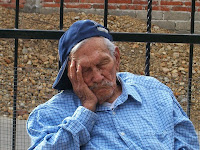While some Alzheimer’s behaviors can be managed medically, many, such as wandering and agitation, cannot. It is more effective to change the person’s surroundings—for example, to remove dangerous items—than to try to change behaviors. Changing the home environment can give the person more freedom to move around independently and safely.
Minimize Danger
People with Alzheimer’s disease may not see, smell, touch, hear, and/or taste things as they used to. You can do things around the house to make life safer and easier for the person. For example:
- Check all rooms for adequate lighting. Use nightlights in bathrooms, bedrooms, and hallways.
- Be careful about small pets. The person may not see the pet and trip over it.
- Reset the water heater to 120 degrees Fahrenheit to prevent burns.
- Label hot-water faucets red and cold-water faucets blue, or write the words “hot” and “cold” near them.
- Install grab bars in the tub/shower and beside the toilet.
- Put signs near the oven, toaster, and other things that get hot. The sign could say, “Stop!” or “Don’t Touch—Very Hot!”
You can also try these tips:
- Check foods in the refrigerator often. Throw out any that have gone bad.
- Put away or lock up things like toothpaste, lotions, shampoos, rubbing alcohol, soap, or perfume. They may look and smell like food to a person with Alzheimer’s.
- If the person wears a hearing aid, check the batteries and settings often. (Continued below ad…)
Amazon helps make dementia-friendly homes:
- BATHROOM: High-contrast color helps dementia see better and avoid accidents.
- KITCHEN: Red Dishes. (Alzheimer’s patients eating from red plates consumed 25% more than white.)
- HOME: Phones for Seniors and People with Dementia
- BEDROOM: Sensors, Pagers and Alarms for Dementia
- LIVING ROOM: 7 Best Clocks for Dementia
Basic Safety for Every Room
Add the following items to the person’s home if they are not already in place:
- Smoke and carbon monoxide detectors in or near the kitchen and in all bedrooms
- Emergency phone numbers and the person’s address near all phones
- Safety knobs and an automatic shut-off switch on the stove
- Childproof plugs for unused electrical outlets and childproof latches on cabinet doors
You can buy home safety products at stores carrying hardware, electronics, medical supplies, and children’s items.
Lock up or remove these potentially dangerous items from the home:
- Medicines
- Alcohol
- Cleaning and household products, such as paint thinner and matches
- Poisonous plants—contact the National Poison Control Center at 1-800-222-1222 or www.poison.org to find out which houseplants are poisonous.
- Guns and other weapons, scissors, knives, power tools, and machinery
- Gasoline cans and other dangerous items in the garage
Moving Around the House
Try these tips to prevent falls and injuries:
- Simplify the home. Too much furniture can make it hard to move around freely.
- Get rid of clutter, such as piles of newspapers and magazines.
- Have a sturdy handrail on stairways.
- Put carpet on stairs, or mark the edges of steps with brightly colored tape so the person can see them more easily.
- Put a gate across the stairs if the person has balance problems.
- Remove small throw rugs. Use rugs with nonskid backing instead.
- Make sure cords to electrical outlets are out of the way or tacked to baseboards.
- Clean up spills right away.
Make sure the person with Alzheimer’s has good floor traction for walking. To make floors less slippery, leave floors unpolished or install nonskid strips. Shoes and slippers with good traction also help the person move around safely.
You may want to re-evaluate the safety of the person’s home as behavior and abilities change.
For more home safety tips, see the NIH / National Institute on Aging’s checklist:





maybe in usa. not much here in england to help,they do not care!